Thursday 29 November 2018 – Suva, Fiji ~ The Pacific Islands Private Sector Organisation (PIPSO) partnered with the United Nations Pacific Regional Anti-Corruption (UNPRAC) programme to hold a Business Breakfast introducing Anti-corruption in Fiji and the Pacific Private Sector.
The two-hour Business Breakfast was held at the Holiday Inn in Suva, Fiji which saw participants from local and regional business bodies, representatives of Small to Medium Enterprises (SMEs) and various stakeholders of private sector in attendance.
The initiative is a seminar/information session tailored to bring together private sector from the Fiji business community and supporting organisations like industry associations and business networks, to learn about the work being done in Fiji and the region on anti-corruption.
Participants had the opportunity to learn about UNPRAC and their work in addressing and preventing corruption and promoting good governance;
- How anti-corruption is a conduit for achieving the Sustainable Development Goals,
- The critical role of private sector in advancing anti-corruption initiatives in the Pacific.
The event also saw a presentation by the Fiji Independent Commission Against Corruption (FICAC) on their newly introduced Corporate Integrity Pledge (CIP) –through which FICAC offers to work with private sector businesses to develop anti-corruption policies and procedures.
Opening formalities was delivered by PIPSO Board Mr Howard Politini to spoke about the negative impacts of Corruption on developing countries and how the private sector could help combat and negate corruption by adopting good business practices, good work ethics and anti-competitive behaviour.
A Panel discussion was at the centre of the event with three panellists from various sectors presenting their own interventions regarding anti-corruption efforts. Panellists were Vani Catanasiga of the Fiji Council of Social Services (FCOSS), Nick Barnes of Munro Leys and Gordon Jenkins of Construction Industry Council. Moderating the panel discussion was Annika Wythes of UNPRAC.
(Edited by Wade Bromley - original submission Thursday, 4 February 2021, 6:53 PM)
(Edited by Wade Bromley - original submission Thursday, 4 February 2021, 6:53 PM)




